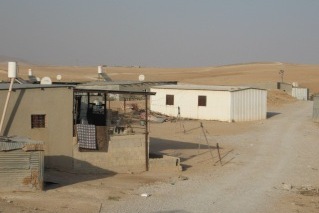 An unrecognized village. Photo by Melanie Takefman
An unrecognized village. Photo by Melanie TakefmanThe Regional Council of Unrecognized Villages (RCUV) in the Negev calls upon the Israeli government: Involve us in the outline plan to arrange status for our villages
Tomorrow, 29/3/2011 at 9:30AM, there will be a hearing in the State Comptroller’s Committee regarding the formulation of an outline plan arranging status for unrecognized Bedouin villages in the Negev. The RCUV, representing village residents, as well as the ACRI and Bimkom organizations expect the recommendations of the Prawer Team to be revealed at the hearing, and yet they fear that these recommendations will only perpetuate the violation of Bedouin rights and will not bring about a real solution.
The Implementation Team headed by Ehud Prawer was appointed by the Israeli government to present a detailed outline for arranging the status of Bedouin settlements and for resolving the contentious “recognition of ownership” issue vis a vis Bedouin citizens and their lands. The team was established following the Goldberg Committee (headed by retired Supreme Court Justice Eliezer Goldberg) and was supposed to have formulated its conclusions by July 2009 at the latest. The recommendations have not yet been published. Despite their ongoing work, team members have refused the requests of RCUV representatives who requested to take part in formulating the recommendations.
According to Salem Aloqili, a spokesman for the RCUV: “Unfortunately, for years the authorities treated the unrecognized Bedouin villages as a security and demographic threat, which is apparently their attitude now as well; they talk about the ‘danger’ of [Bedouin] territorial contiguity as if we were enemies, not citizens of the state. We do not invade, nor do we take over. We merely seek recognition of our communities, as befitting citizens of the same country who share equal rights.”
Nili Baruch, an urban planner with the organization Bimkom – Planners for Planning Rights, explains that, “It is possible to advance planning for the villages and advance recognition of their status, even before an agreed solution is found regarding land ownership claims. As of today, the authorities do not provide any planning solutions to the crisis faced by village residents, and leave them no other choice than to build illegally without a permit. Meanwhile, the authorities continue to demolish buildings without permits, leaving the villagers helpless and homeless.”
ACRI Attorney Rawia Aburabia added: “Over the years, state authorities have consistently ignored Bedouin citizens, while employing a discriminatory policy that harms their most basic rights to equality, to shelter, and to dignity. Now we have an opportunity to correct this historical injustice – if the government refrains from taking unilateral steps and if it involves the Bedouin in helping determine their future.”
Representatives of the RCUV, Bimkom, and ACRI will be present at tomorrow’s hearing. The organizations promise to continue monitoring the activities of the Prawer Team and to work towards a mutually agreed upon solution in which the villages will be recognized and the claims on land ownership will be reconciled.







